Selling on Amazon comes with fees, deductions, and payouts that can make bookkeeping a nightmare.
Unlike traditional sales where revenue flows directly into your account, Amazon deducts multiple costs, referral fees, fulfillment charges, advertising spend, refunds, storage fees, and even tax withholdings, before sending you a payout.
For sellers, accountants, and finance professionals, reconciling these transactions is fundamental.
However, manually matching Amazon deposits with your sales reports can be incredibly time-consuming.
There is a better way- automating reconciliation with Link My Books simplifies this process by categorizing every Amazon transaction and feeding it directly into Xero or QuickBooks, ensuring 100% accuracy with minimal effort.
Key Takeaways from this Post
Amazon deposits don’t match total sales due to deductions like fees, refunds, and taxes, making manual reconciliation complex and time-consuming.
Accurate reconciliation is essential for tracking profitability, ensuring tax compliance, and catching discrepancies that could impact your bottom line.
Automating with Link My Books eliminates manual errors by categorizing transactions and syncing them with your accounting software.







Where Most Amazon Sellers Go Wrong with Reconciling Charges
If you’re manually reconciling Amazon charges, you’re probably wasting hours on a process that could be automated in minutes.
Many sellers assume they just need to match their Amazon payout to their bank deposit, but this is where they go wrong. Amazon payouts don’t reflect total sales, they’re a net amount after multiple deductions like referral fees, FBA fulfillment costs, refunds, and even withheld taxes. This makes a simple "check your bank statement" approach completely ineffective.
Common Mistakes Sellers Make:
- Assuming the payout equals revenue: It doesn’t. Amazon deducts multiple fees before paying you.
- Manually tracking fees and deductions: Amazon’s reports are complex, scattered, and not built for easy reconciliation.
- Ignoring VAT & sales tax compliance: Incorrect categorization can lead to costly tax errors.
- Manually doing their Amazon 1099-K form: This often leads to discrepancies and needless headaches.
- Spending too much time on spreadsheets: Manual reconciliation is tedious, and errors can cost you money.
The Right Way to Reconcile Amazon Charges - Automation
Instead of struggling with spreadsheets, Link My Books automates reconciliation by categorizing every Amazon transaction and syncing it with Xero or QuickBooks, ensuring 100% accuracy with zero manual effort.
Before you waste another hour manually reconciling Amazon charges, let’s walk through how to do it the right way, efficiently and accurately.
How to Reconcile Amazon Charges
- Link Your Amazon Account to Xero or QuickBooks via Link My Books
- Validate Transactions Automatically
- Generate an Organized Summary in Xero or QuickBooks
- Reconcile Transactions in One Click
Step #1: Link Your Amazon Account to Xero or QuickBooks via Link My Books
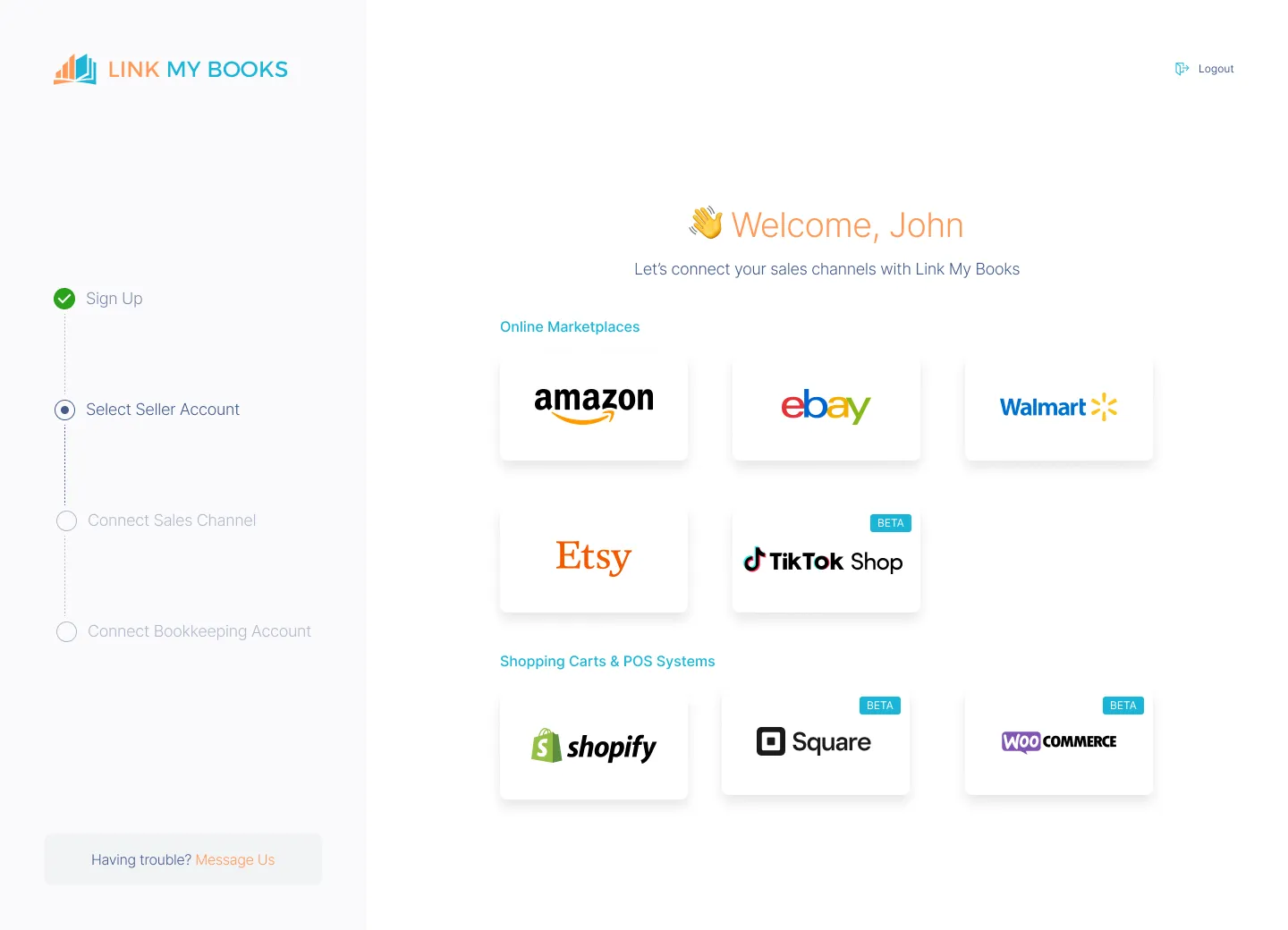
The first step in automating your Amazon charge reconciliation is connecting your accounts.
- Sign up for Link My Books and connect your Amazon Seller account.
- Link your Xero or QuickBooks account.
✅ This setup takes just a few minutes and ensures every transaction is automatically pulled into your accounting software.
Step #2: Validate Transactions Automatically
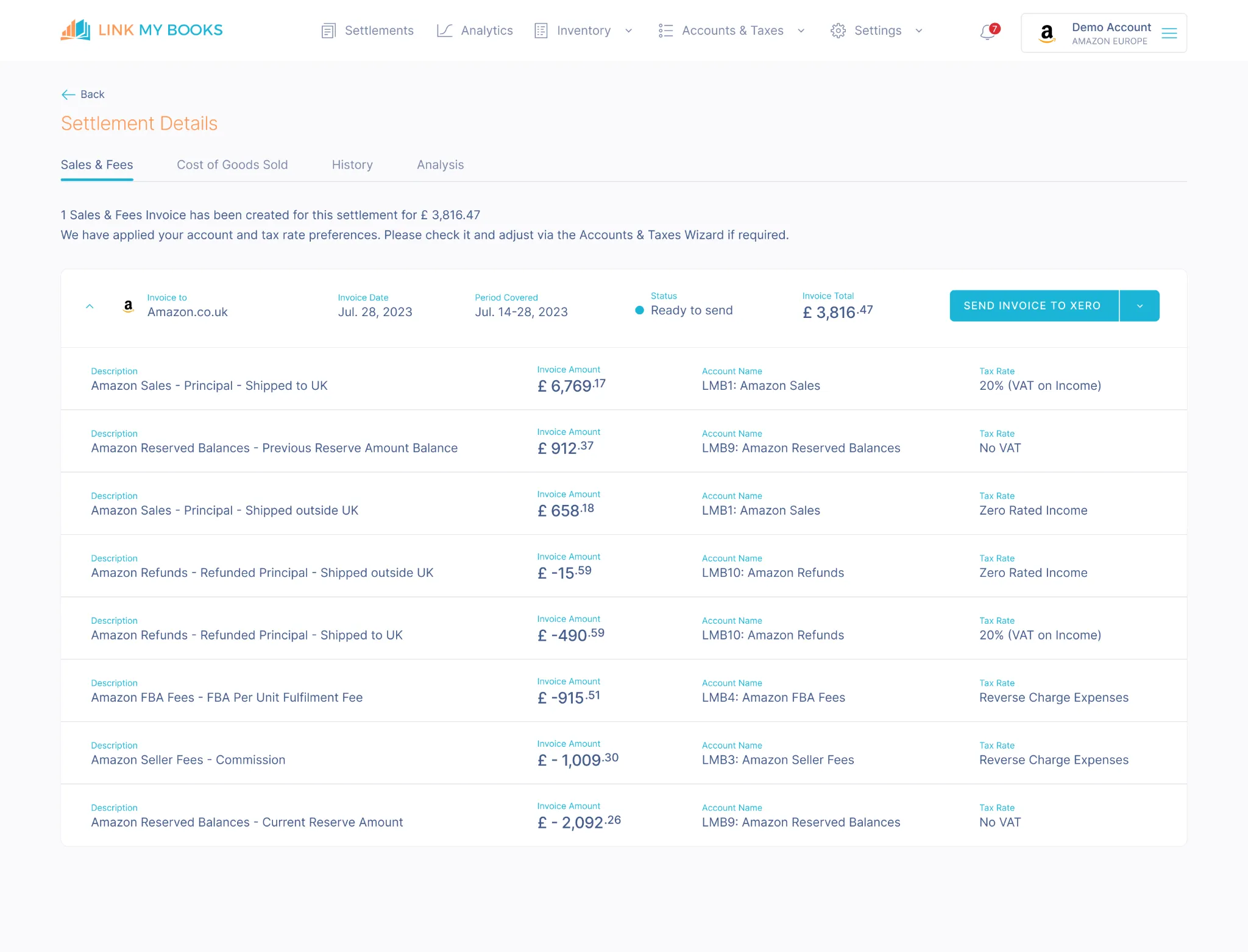
Once your accounts are linked, Link My Books automatically imports and categorizes your Amazon transactions, ensuring accuracy.
What gets validated?
- Sales revenue (including different marketplaces)
- Amazon fees (referral fees, FBA fees, etc.)
- Refunds and chargebacks
- Sales tax and VAT
✅ This eliminates manual errors and ensures tax compliance.
Step #3: Generate an Organized Summary in Xero or QuickBooks
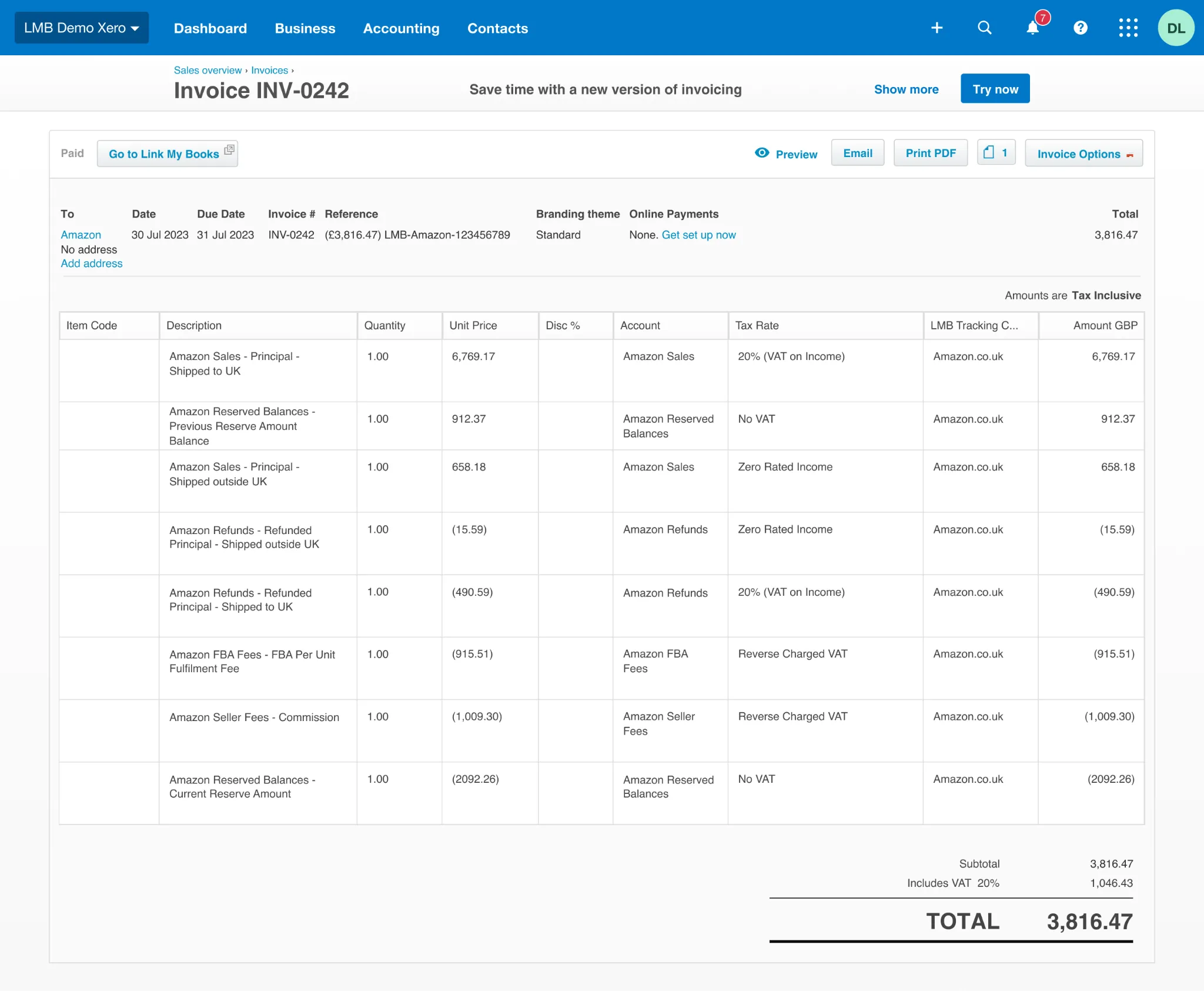
After validating transactions, Link My Books creates a structured summary that feeds directly into Xero or QuickBooks.
How It works:
- Transactions are grouped logically (e.g., sales, fees, refunds).
- VAT and sales tax amounts are automatically categorized.
- Everything is prepared in an easy-to-read format for quick review.
✅ No more messy Amazon reports, everything is structured and accurate.
Step #4: Reconcile Transactions in One Click
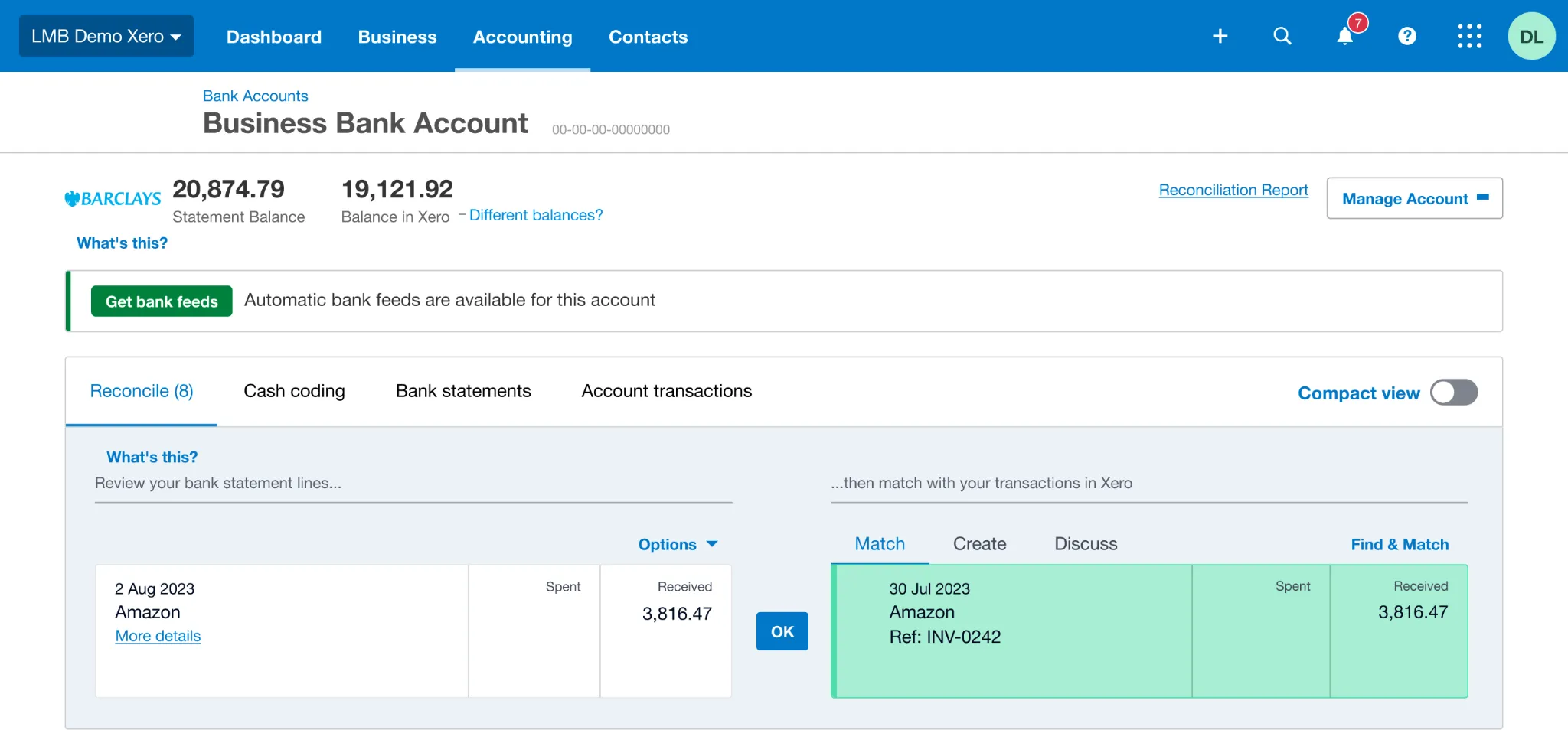
With your transactions neatly summarized, final reconciliation is effortless.
How to complete the reconciliation:
- Review the pre-organized Amazon summary in Xero or QuickBooks.
- Click "Reconcile"- and you're done!
🚀 With the right Amazon reconciliation software your Amazon bookkeeping can be fully automated, accurate, and stress-free.
How Link My Books Makes Reconciling Amazon Charges Simple
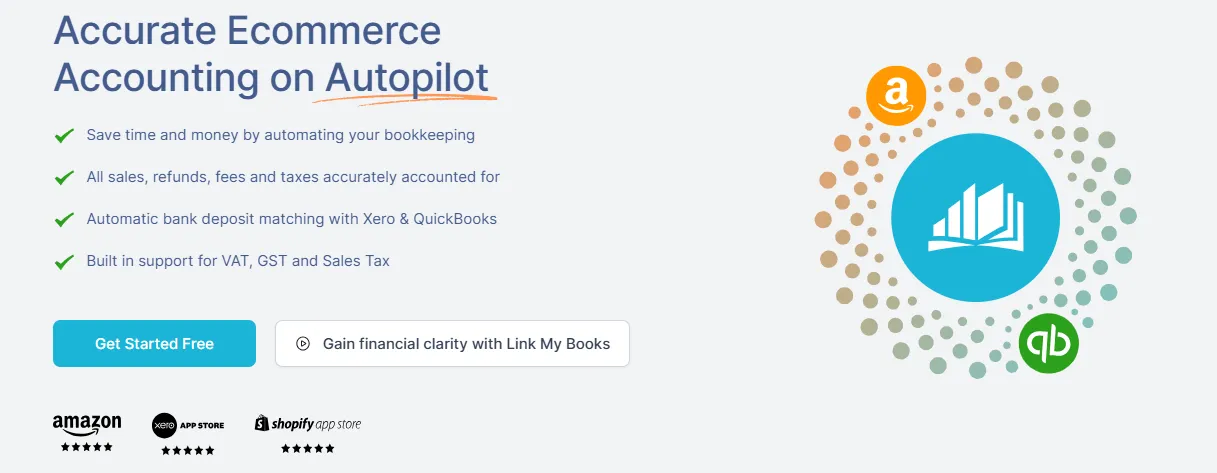
Link My Books automates the entire reconciliation process, ensuring that every Amazon transaction is correctly categorized and matched to your bank deposits with complete accuracy. By automatically sorting sales, fees, refunds, and taxes, and applying the correct tax rates, it eliminates manual work and guarantees that your financial records are audit-ready. With just a few clicks, you can reconcile Amazon payouts effortlessly.
But Link My Books doesn’t stop at reconciliation. Here’s why it’s a must-have tool for Amazon sellers:
Effortless Tax Compliance With Accurate Calculations

Managing VAT, GST, and sales tax is a challenge, especially if you're selling in multiple regions. Link My Books automatically applies the correct tax rates to every transaction, whether domestic or international. This means your tax reporting is always accurate, reducing the risk of overpayments, underpayments, or compliance issues.
Clear Profitability Insights Across Sales Channels

Selling on multiple platforms, like Amazon, eBay, Shopify, or Etsy, can make it difficult to track profitability across different marketplaces. Link My Books organizes financial data by sales channel, allowing you to:
- Compare revenue, expenses, and profit margins across platforms.
- Allocate resources to the most profitable areas of your business.
- Generate simplified, data-driven reports for smarter decision-making.
Automated Cost of Goods Sold (COGS) Tracking

Understanding your true profit margins requires accurate COGS tracking. Link My Books automatically assigns inventory costs to the right expense accounts, ensuring your financial reports reflect your actual profitability. With this level of accuracy, you can make better-informed pricing and inventory decisions.
Multi-Currency Reconciliation Made Simple
If you sell internationally, you may receive Amazon payouts in multiple currencies, making reconciliation a challenge due to fluctuating exchange rates. Link My Books automatically converts all transactions to your base currency using the correct exchange rates, ensuring your financial records remain precise and consistent.
Quick and Easy Setup, Scalable for Growth

Getting started with Link My Books is seamless. A guided setup wizard walks you through the process, and free 1:1 onboarding support ensures everything is configured correctly.
Whether you’re processing a handful of orders or handling thousands per day, Link My Books scales effortlessly with your business, keeping your financial records accurate as you grow.
And you can try it out for free, you don’t even need a credit card! 🚀
The Different Types of Amazon Charges That Need Reconciliation

Amazon settlements are not as straightforward as they seem. Sellers often assume that the amount Amazon deposits into their bank account represents their total earnings, but in reality, it’s a net figure after multiple deductions. To maintain accurate financial records, sellers need to track and reconcile all the different types of charges that affect their bottom line.
Here are the key Amazon charges that require reconciliation:
1. Selling Fees
Every time you make a sale on Amazon, various selling fees are deducted before you receive your payout. These fees vary depending on the category of the product and the type of seller account you have.
- Referral Fees: A percentage of each sale, based on the product category.
- Closing Fees: Additional fees for media products like books, DVDs, and video games.
- High-Volume Listing Fees: Charged to sellers with large numbers of active listings.
📌 Why It Matters: Failing to track these fees properly can lead to miscalculating profit margins and underestimating business costs.
2. Payouts and Deposits
Amazon pays sellers periodically (usually every two weeks), but the deposit amount rarely matches the total sales revenue. This is because Amazon deducts fees, refunds, and other charges before transferring the funds.
To reconcile these payouts properly, sellers must:
- Identify the total sales amount for the period.
- Deduct Amazon fees, refunds, and other adjustments.
- Match the final deposit amount to the bank transaction.
📌 Why It Matters: Without proper reconciliation, it’s easy to miss discrepancies or lose track of unrecorded transactions.
3. Amazon FBA Fees
If you use Fulfillment by Amazon (FBA), additional fees are deducted for storing, packing, and shipping your products. These fees include:
- Fulfillment Fees: Charged per unit for picking, packing, and shipping orders.
- Storage Fees: Monthly fees for inventory stored in Amazon’s warehouses.
- Long-Term Storage Fees: Additional charges for inventory stored for more than 365 days.
- Removal Fees: Charged if you request Amazon to remove unsold inventory.
📌 Why It Matters: These costs fluctuate based on seasonality and inventory levels, so tracking them correctly ensures accurate expense reporting.
4. Refunds and Chargebacks
When a customer returns a product, Amazon deducts the refund amount from your balance, often alongside additional fees.
- Refund Administration Fees: A percentage of the refunded amount, retained by Amazon.
- Chargebacks: Fees for disputes where customers claim they didn’t receive an item.
📌 Why It Matters: Refunds and chargebacks affect cash flow and profitability, making them crucial to track and reconcile.
5. Advertising and Promotional Costs
Many Amazon sellers invest in Amazon PPC (Pay-Per-Click) advertising to drive sales. These costs are deducted automatically from your balance.
- Sponsored Product Ads: Ads that appear in search results and product pages.
- Sponsored Brand Ads: Ads that promote multiple products under your brand name.
- Coupons & Promotions: Discounts offered to customers, deducted from your earnings.
📌 Why It Matters: Advertising costs can eat into profits if not monitored closely. Accurate reconciliation helps measure ROI on ad spend.
6. Other Deductions and Adjustments
Amazon applies various other charges that sellers need to account for:
- Currency Conversion Fees: If you sell in multiple countries, Amazon may deduct conversion fees.
- Warehouse Damage Reimbursements: If Amazon damages your inventory, they may reimburse you (but you must track it).
- Miscellaneous Adjustments: Amazon occasionally makes manual adjustments for errors or disputes.
📌 Why It Matters: Untracked reimbursements or deductions can lead to misreported revenue or missed earnings.
Why Automation is Key to Managing These Charges
With so many different types of fees and deductions, manual reconciliation is time-consuming and prone to errors. Link My Books combined with your accounting software automates this process, categorizing every transaction and syncing it directly with Xero or QuickBooks, so sellers can:
- Accurately track Amazon fees and deductions without digging through reports.
- Ensure deposits match accounting records, eliminating discrepancies.
- Automate tax compliance, ensuring VAT, GST, and sales tax are recorded correctly.
Take control of your e-commerce finances - Start your free trial today. 🚀
What About Reconciling Amazon Charges for Personal Accounts?

While this guide focuses on Amazon sellers, individual buyers may also need to reconcile their Amazon charges, especially when reviewing credit card statements or tracking personal expenses. If you’ve ever noticed an unfamiliar charge from Amazon, here’s how to verify and reconcile your purchases.
1. Use Amazon Order History to Verify Purchases
The easiest way to confirm a charge is to check your order history in your Amazon account.
Steps to Verify a Charge:
- Log into Amazon and go to Your Orders.
- Use the search bar or filter by date to find the purchase in question.
- Compare the order total with the amount charged on your bank or credit card statement.
If you have multiple Amazon accounts (personal, business, family), check all of them to ensure the purchase wasn’t made under a different account.
2. Match Charges with Order Names
Amazon transactions on your bank statement don’t always show detailed descriptions, which can make identifying purchases difficult.
- Look for partial order descriptions in your Amazon account and compare them to the charge.
- Consider bundled or split orders, sometimes, Amazon ships items separately and charges them individually.
- Check for digital purchases like Kindle books, Prime Video rentals, or app subscriptions that may not appear in your main order list.
If the charge is slightly higher than expected, it may include tax, shipping, or an auto-renewed subscription fee.
3. Watch for Subscription Renewals & Pre-Authorizations
Amazon charges aren’t always tied to physical product orders. Some common non-product-related charges include:
- Amazon Prime membership renewals
- Amazon Music, Kindle Unlimited, or Audible subscriptions
- Amazon Pay transactions from third-party websites
- Pre-authorized holds on payment methods (which may disappear after a few days)
Go to Your Memberships & Subscriptions in Amazon to check for recurring charges.
4. Resolve Discrepancies with Amazon Support
If you still can’t identify a charge, Amazon’s customer support can help.
How to Dispute or Inquire About a Charge:
- Go to Amazon Help and select Contact Us.
- Choose Payments & Charges as the topic.
- Provide details about the charge, including the date and amount.
- Amazon will investigate and, if necessary, issue a refund for unauthorized transactions.
If you suspect fraud, contact your bank immediately to report the charge and request a card replacement if needed.
Why Personal Reconciliation Matters
Even as an individual, reconciling Amazon charges can help:
✅ Catch fraudulent or unauthorized transactions.
✅ Avoid unnecessary subscriptions or duplicate charges.
✅ Stay on top of personal finances and budget effectively.
By following these steps, you can keep your financial records accurate and ensure you’re only paying for purchases you actually made.
FAQ on Amazon Charges Payment Reconciliation

How often should I reconcile my Amazon charges?
It’s best to reconcile your Amazon charges at least once per settlement period—which is typically every two weeks. Since Amazon deducts fees, refunds, and other adjustments before sending payouts, waiting too long can make it harder to track discrepancies.
For high-volume sellers, weekly or even daily reconciliation ensures financial records stay accurate and up to date. Automating the process with Link My Books eliminates manual effort and ensures real-time accuracy.
Why don’t my Amazon sales match my payouts?
Amazon payouts rarely match total sales because Amazon deducts various fees, refunds, and taxes before depositing funds into your bank account. Some common reasons include:
- Selling fees (e.g., referral fees, closing fees, FBA fees)
- Refunds and chargebacks deducted from your balance
- Advertising costs if using Amazon PPC
- Sales tax or VAT withholdings in certain regions
- Currency conversion fees for international sellers
With so many deductions, manually tracking these adjustments can be challenging. Link My Books automatically categorizes all sales, fees, and deductions, ensuring your accounting software reflects the correct financial data.
How does Link My Books handle sales tax and VAT?
Link My Books automatically categorizes sales tax and VAT for accurate reporting. It recognizes whether Amazon has collected and remitted tax on your behalf (such as Marketplace Facilitator Tax) or if you need to account for it manually.
For VAT-registered businesses, Link My Books correctly assigns VAT amounts to the appropriate tax codes in Xero or QuickBooks, ensuring compliance with HMRC, EU, and other tax authorities.
This automation eliminates tax errors, ensuring that you only pay what you owe while keeping your financial records audit-ready.
Reconcile Your Amazon Charges Automatically With Link My Books

With Amazon’s complex fee structures, tax deductions, and multi-channel sales, manual reconciliation isn’t just inefficient, it’s unnecessary. Link My Books removes the guesswork, giving you accurate, audit-ready financials with minimal effort.
Ready to simplify your Amazon bookkeeping? Start your free trial today. 🚀

.webp)


![How to Reconcile Amazon Charges in 2026 [Easy Automation]](https://cdn.prod.website-files.com/60af32ce0a63dc4f22cc85a1/67b481369b5eeea598e2eba7_How%20to%20Reconcile%20Amazon%20Charges.webp)










.webp)




.png)